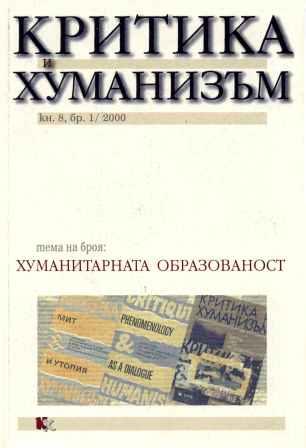Образованието в епохата на старогръцката класика като проблем на културата
Education in Classical Greece as a Cultural Problem
Author(s): Violeta GerdzhikovaSubject(s): Social Sciences
Published by: Фондация за хуманитарни и социални изследвания - София
Summary/Abstract: As a part of a larger study of views and concepts connected with the idea of culture in classical Greek prose, this paper takes as its starting point a brief survey of the history of Greek education and emphasizes on specific features in its development in the 4-th century B.C. which largely fostered thorough examination of the potentialities, means and objectives of human education. Exploring respective passages in the works of the great educators of the period - Plato, Isocrates and Aristoteles, we can discover significant differences in defining their principal goals and methods, but also certain general ideas that lie behind speculating on education as a form of cultural discourse. Each of these authors stresses on training the mental and intellectual powers of the individual, and aims at forming a broad-minded, politically engaged and morally elevated person, far from being submitted to pragmatic or inferior crafts and pursuits. While Isocrates focuses on universal aptness and civility, Plato seeks after making use of education as a powerful device for constructing a new type of society and culture. Though more realistic in his social project, Aristoteles gives a good account of the general ancient views on education: it is liberal, non-pragmatic, not intended to secure professional qualification or economic prosperity, but rather the ability of understanding and judging other people's achievements and the aspiration for higher aims and ideals. Therefore, although European tradition in educational institutions and subjects goes back to ancient Greece, there is a considerable shift in emphasis between ancient and modern educational standards and ideals. The paper also deals with some points of similarity in the way Greek authors express educational ideas through typical comparisons and metaphors; in particular through comparison of education with taming of wild animals and with agriculture as an instance of a basic cultivating process.
Journal: Критика и хуманизъм
- Issue Year: 2000
- Issue No: 08
- Page Range: 101-120
- Page Count: 20
- Language: Bulgarian
- Content File-PDF

